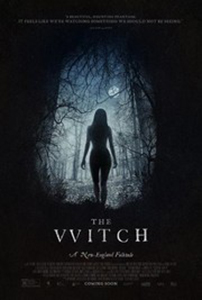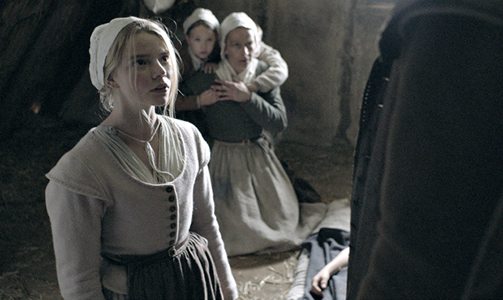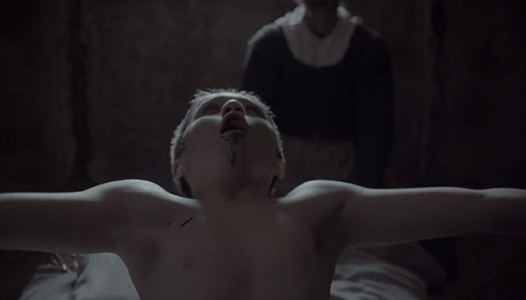“We ourselves were not capable to understand, nor able to withstand the mysterious delusions of the Powers of Darkness and Prince of the Air; but were for want of Knowledge in ourselves, and better Information from others, prevailed with to take up with such Evidence against the Accused, as on further consideration, and better Information, we justly fear was insufficient for the touching the Lives of any, Deut. 17.6, whereby we fear we have been instrumental with others, tho Ignorantly and unwittingly, to bring upon ourselves and this People of the Lord, the Guilt of Innocent Blood.”
– Confession of the twelve jurors at the Salem Witch Trials
A Kubrickian take on horror, much like “The Shining,” this is a film that offers much more than the simple horror of a Stephen King novel. This is an obvious labor of love from first-time director Robert Eggers and a largely unknown cast. The research into the environment and dialogue, much of which was taken from actual writing of the time, is impressive. Then there is the careful attention to the camera work and soundtrack. At the surface, this is a fairly basic folk tale of a family in the grips of the devil. Yet there are layers of implied metaphor on the nature of religion, being human, and adolescence that never fully get answered. While the visuals and subject are unpleasant enough, it is this lack of true clarity into what or why the horror is happening that makes this a truly memorable film.
Upon threat of banishment by the church, an English farmer leaves his colonial plantation, relocating his wife and five children to a remote plot of land on the edge of an ominous forest – within which lurks an unknown evil. Strange and unsettling things begin to happen almost immediately – animals turn malevolent, crops fail, and one child disappears as another becomes seemingly possessed by an evil spirit. With suspicion and paranoia mounting, family members accuse teenage daughter Thomasin of witchcraft, charges she adamantly denies. As circumstances grow more treacherous, each family member’s faith, loyalty and love become tested in shocking and unforgettable ways. (Synopsis by A24 Films)
In a word, this film is unsettling. The slow pacing works wonders to build the anxiety as increasingly bizarre and terrible things befall the family. Despite how that sounds, this doesn’t play like the typical horror film build. This is atmospheric horror in a way that is less scary than uncomfortable to watch. Adding to this is Eggers’ refusal to shy away from controversial metaphors. The major theme of religion is prominently on display in both its glory and its complications. Much of the film builds up to a confrontation during which the oldest daughter Thomasin (Anya Taylor-Joy) being accused of bewitching the family. The parallels to the Salem Witch trials are intentional, but are handled in a way that is both historically accurate and within the scope of the fantastical horror being shown. At no point do you know if the terrible events are truly the work of the devil or are the vivid fantasy brought on by the family as they confront increasing hardships under the duress of their oppressive religious views.
At the same time, Thomasin and her oldest brother Caleb (Harvey Scrimshaw) are transitioning into adulthood. These themes become magnified under the events that unfold, as each child undergoes their own version of having their childhood torn away. Much has been made of Taylor-Joy’s performance as a first time actress, and right fully so. She and Scrimshaw, also in his first role, put on an acting tour de force that is equal parts innocent and chilling. Equal to the task are the more experienced adult leads Ralph Ineson and Kate Dickie. As the events unfold, Katherin (Dickie) falls further into grief fueled madness while William (Ineson) attempts to hold the family together until he too eventually breaks.
Few horror films ever get outside of genre tropes to become “thoughtful” in their own right. Thankfully, the current trend is toward more intelligent film as a general rule; at least outside of the major studio releases. This is one of the best examples available within the genre of a film that is equal parts horror and thought-provoking. Simply put, there is a lot going on in this script, beyond the fastidious attention to period detail. It takes risks and ratchets up the horror in ways that almost entirely add to the narrative. This is a carefully woven tale and is one of the best films to come out this year, as shown by Eggers’ win as Best Director at Sundance last year. It will keep you thinking long after the theater in both inquisitive and uncomfortable ways.
“See It/ Rent It/ Skip It”: See it. The goat is always Satan. Always.
THREE STARS out of four.
Directed by: Robert Eggers
Rated R for disturbing violent content and graphic nudity.
Runtime: 1 hour and 32 minutes






Leave a Reply
You must be logged in to post a comment.